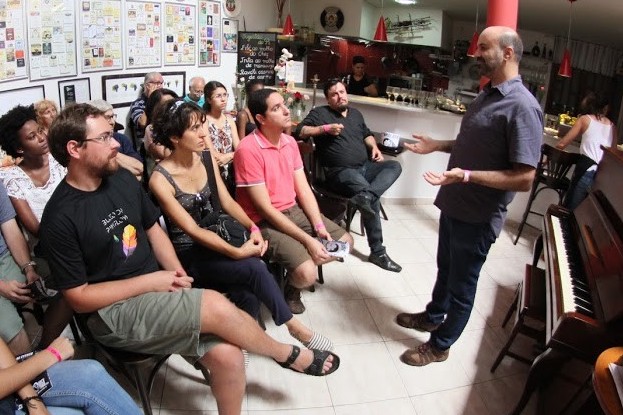Nestled among rolling green hills, coffee plantations and dairy farms, Santa Rita do Sapucaí is steeped in the agricultural traditions of Brazil’s Minas Gerais state. But there’s more to this bucolic town of 40,000 than quaint churches, country cooking and great coffee: it has successfully reinvented itself as a technology hub.
City officials and heads of industry boast they’re an example for other small towns to follow – and they’re right. Drawing talent from local universities – some of Brazil’s best when it comes to tech – and supported by a partnership of public and the private sectors, the effort has spawned around 50 startups and over 150 technology-based companies that generate R$3.2 billion ($1 billion) in revenue annually, and some 10,000 jobs.
All this has put Santa Rita do Sapucaí on the map as Brazil’s “Electronics Valley.”
“We’re betting on creativity and innovation,” said Wander Wilson Chaves, the city’s vice-mayor, who is also a professor and the former head of a local tech-focused business school.
The town’s newfound vocation was tested during Brazil’s persistent recession, when one in four young people were unemployed and investment in education, research, health and other key sectors plummeted. But the energy of the tech sector helped Santa Rita’s population weather the worst of the crisis, and emerge with a reputation for innovation.
This will be on full display on the first weekend of September, when it hosts Hack Town, a sort of off-the-grid techie South by Southwest that has attracted companies like Google, Uber, and IBM as well as innovators, entrepreneurs, designers, and other Brazilians at the forefront of the field.
The event was born after a Santa Rita local, Carlos Henrique Vilela, visited South by Southwest in Austin, Texas in 2014, and decided to try it at home. After a few test runs in 2016, this will be the first full edition of the event, and the largest, with about 2,000 participants from 16 of Brazil’s 26 states as well as international guests.
Similar to the Texas festival, lectures and workshops will be held at local bars, restaurants and university lecture halls. They have bands lined up and local restaurants and breweries are holding a food festival to coincide with the event. Topics of discussion will range from artificial intelligence, UX design and web analytics to music festival marketing.
“We’ve been able to unite a diverse group of innovators, which is great,” Vilela said.
Speakers include the community manager at WeWork Brazil, who will present on the advantages of community management strategy, and a music mogul who specializes in promoting Brazilian artists abroad. Google is hosting a “Developer’s Launchpad” house, which provides mentorship and workshops for startups. Facebook’s “Developer’s Circle” initiative will put on a workshop called “exponential connections,” to debate artificial intelligence, blockchain and machine learning.
Other Brazilian innovators at the festival will discuss new solutions for some of the country’s age-old problems. Nathalia Tavares, a Hack Town lecturer, will speak about her work lobbying to translate valuable scientific research for the market – a major challenge in Brazil, she said.
“Brazilian academic culture doesn’t envision much in terms of entrepreneurship,” Tavares told AQ. “A lot of the research from universities never reaches the market.”
Beyond the cultural barriers, there are hard obstacles, such as legislation that only allows professors at federal universities to spend a limited time on research for the private sector.
“In Brazil, we’re not recognized for being a hub for scientific production, but when you look at the research that’s being done, there’s so much value,” she said, citing recent university-led accomplishments like developing a sticker that identifies when raw chicken has gone bad, or research about combating the Aedes Aegypti mosquito, which spreads diseases such as Dengue, Zika and Chikungunya.
These studies would do much good if connected to the market, she argued.
Another speaker, João Souza, is the founder of Brazil’s first favela-based accelerator, FA.VELA – a mentorship program that teaches tech skills and best practices to favela-based businesses in the nearby city of Belo Horizonte. Souza, a native of the Morro das Pedras favela in Belo Horizonte, explained that favela residents naturally tend to pursue “frugal innovation” strategies. His talk will discuss how these communities could be the source of the next disruptive innovation in the field.
“People in favelas come up with cheap, innovative solutions with very few resources,” he said. “They start businesses out of necessity, to have a better life, to ‘put beans in the can,’ which gives them a different perspective.”
Although this year’s Hack Town is putting Santa Rita on the tech map, the town’s journey to becoming Brazil’s Electronics Valley started in 1950, when a Santa Rita native attended a lecture by Albert Einstein.
The Nobel-prize winner said electronics would be the industry of the future, said Luzia Renno Moreira, who took note. Moreira is also the niece of former Brazilian president, Delfim Moreira, and worked with him to open, in Santa Rita, the first educational institute devoted to electronics in Latin America, the Escola Técnica de Eletrônica, or Technical School of Electronics (ETE) in 1959.
Following suit, two more of Brazil’s best business schools opened in the city, the Inatel, or National Institute of Telecommunications, and FAI, which focuses on business administration and technology. Today, 90 percent of the companies in Santa Rita have at least one founder who graduated from Inatel.
This strong academic and business culture, and a specialization in one field – telecoms – has been the foundation for the city’s success as a tech hub, said Vilela, who recommends the same strategy to other small and mid-sized towns.
The city government has been actively involved in fostering innovation as well. A push from a former mayor to bring more electronics companies during the economic crisis of the 1980s helped capitalize on the city’s academic and business potential. Today, the city is part of a collective with the universities and the private sector called, “Creative City, Happy City.” The city government also sponsors an incubator program that hosts 14 startup companies at any given time.
But even Santa Rita isn’t exempt from the difficulties tech startups face in Brazil. Industry experts across the board lament the lack of access to capital in Brazil, where investors tend to be more risk-averse than in places like Silicon Valley. High taxes, strict labor laws, and Brazil’s infamous bureaucracy have also posed challenges to this market’s growth.
Perhaps Santa Rita’s success can encourage policy-makers on a federal level to tackle these obstacles, and serve as a template for other towns, Vilela said.
“It’s no mystery that the world is increasingly running on technology,” he said. “If we don’t invest in the tech industry, we run the risk of falling behind.”
—
Kaiser is a journalist based in Brazil





